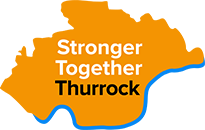
Local Area Coordination is a long-term, person centred, strength and evidence-based approach to supporting people who may be socially isolated, lonely, excluded, or feeling marginalised. Launched in June 2013, our Local Area Coordinators work to strengthen the capacity of communities to welcome and include people and to make services more personal, flexible, and accountable. They support with building more welcoming, inclusive, and supportive communities.
Local Area Coordinators (LACs) support those who are vulnerable to find ways to achieve their vision of a good life. They Cover all areas in Thurrock and are based in towns and villages. They are known to the local communities and people, and will work alongside them to find practical, sustainable, and no or low-cost solutions through the networks and community resources to ensure that those who are most vulnerable are supported- building and pursuing a positive vision for Thurrock.
Local Area Coordination is all about supporting our residents to stay strong, safe, well, resilient, independent, and connected as contributing citizens to their local communities.

Who can get help?
Help is offered to adults aged 18 and over, many of whom are elderly, typically with either:
- feelings of isolation
- depression
- physical disability
- sensory impairment
- learning difficulties
- complex mental health problems
Vulnerable people can be introduced to their local area coordinator by:
- their GP or health organisations
- local community groups, or representatives such as councillors
Making connections
Local area coordinators want to help people avoid reaching a crisis in their life or help them to recover if a crisis has already happened.
They know who to talk with, and how local community and care services work. This includes:
- council services
- health services
- police and fire services
- volunteer organisations
- community groups
You can read more examples of help offered.
What your Local Area coordinators do:
- Support people to feel safe, more confident, and independent to achieve their vision of a good life
- Find practical ways of doing the things you want or need to do.
- Get information, advice and support they need
- Support them with meeting new people and connect with their local community
- Make the best of their talents, skills and abilities and find ways to share them
- Have their voices heard, so they feel in control to make their own choices
- Be more involved with groups, activities, or volunteering in their community
Examples of what Local Area Coordinators don’t do
- Use statutory services as first option
- Replace formal services or specialist support
- Do statutory assessments
- Do “TO” or “FOR”
- Manage care packages or budgets on behalf of individuals
- Run / own community activities / projects
- Have meetings without people / or people’s consent
- Introduce someone without the individual’s consent
- Give up on people
- Categorise or label people
- Tell people what to do.
How does it work?
- A Local Area Coordinator is based locally and is a single, accessible point of contact for people in their local community
- They will take time to listen and get to know individuals, families, and communities well, over time building a more personal, positive, and trusting relationship
- They are a resource to anyone in the community for short term support, information, advice, or connections to local resources
- They will also support individuals and their families, who may benefit from longer term support.
How is Local Area Coordination different?
- People often talk about how the social care and health system can be complicated to navigate and sometimes are only able to respond in a crisis.
- Local Area Coordination creates a single accessible point of contact in a local community and is designed to support people to avoid a crisis in the first place. ·
- Local Area Coordinators work alongside people in the local community. ·
- Local Area Coordinators take a preventative approach; they take time to get to know individuals and families, their local communities and service partners and help people to explore what’s important to them, an individual’s personal vision of a good life and ways of getting there. ·
- Identify, nurture and use/share their personal strengths, skills, experiences, and those of their communities. ·
What difference does Local Area Coordination make?
There have been many studies in different parts of the UK and internationally over the past 28 years. these have shown that, where it is done properly and there is a strong leadership and real community contribution, Local area Coordination leads to consistent, positive outcomes. These include:
- People feeling safer and more confident in the future
- Good partnership working with community resources and services
- People finding practical, local ways of solving problems or dealing with crises
- Individuals having more friends and supportive relationships
- Having better access to information, so increasing choice, and control
- Being able to be part of and contributing to local communities
- Having better knowledge of the community resources and better access to services.
- Families and carers able to continue their caring role.
What people say about Local Area Coordinators?
“I honestly feel like I have been reborn… I am now placed in a situation I only dreamed I could have been”
“She kind of helped me become myself again”
“ I wouldn’t be where I am right now if it wasn’t for the LACs’ support… I would be homeless”
- Testimonies from individual’s supported by different Local Area Coordinators.

